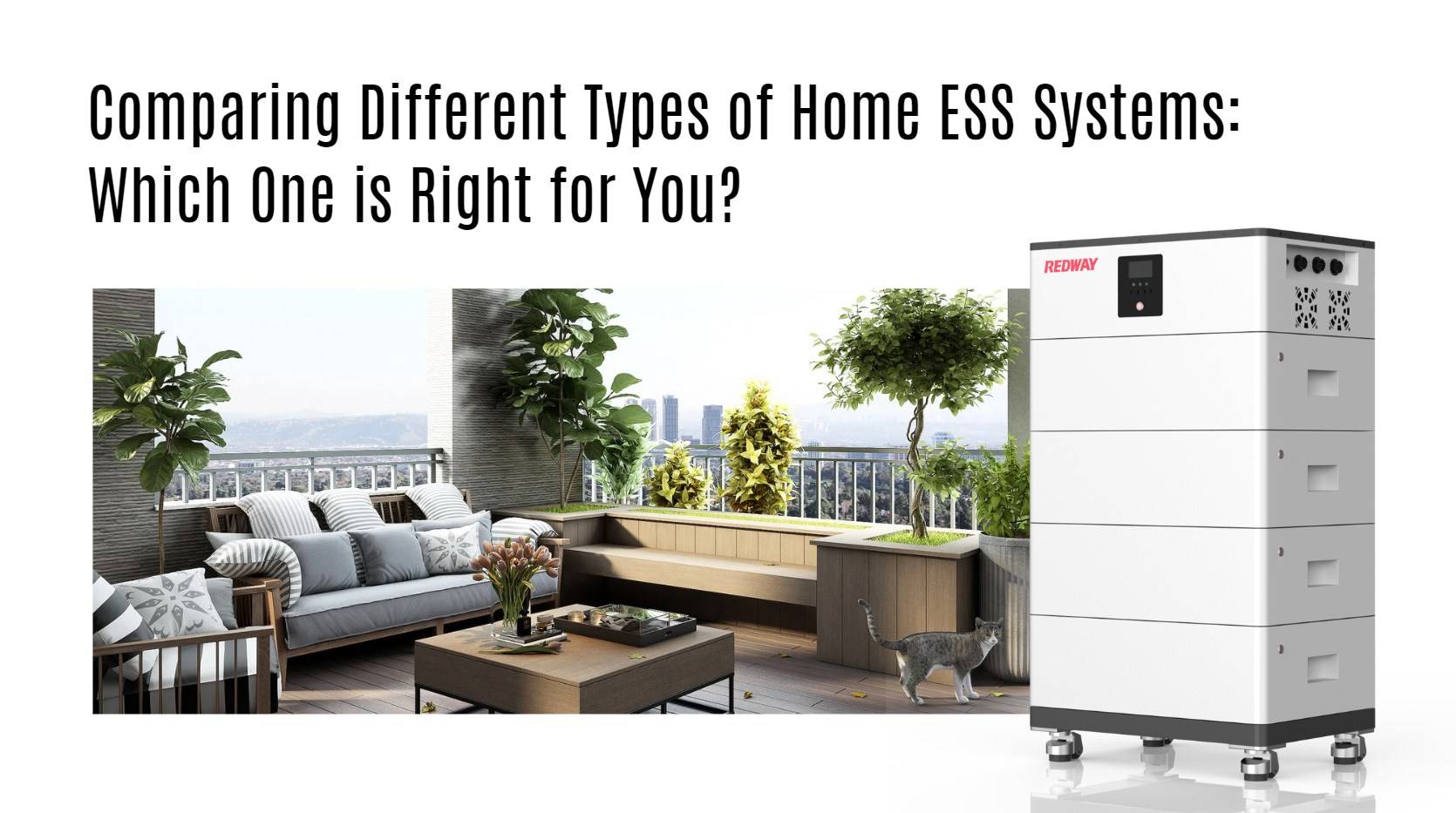Choosing the right home energy storage system (ESS) can significantly enhance your home’s efficiency and sustainability. With various options available, understanding the differences between battery types, their applications, and the benefits they provide is crucial. This article will explore the different types of home ESS, compare lithium-ion and lead-acid batteries, and highlight key factors to consider when making your choice.
What are the different types of home energy storage systems available?
Home energy storage systems can be categorized into several types based on their technology and application:
- Lithium-Ion Batteries: Known for their high energy density, long cycle life, and fast charging capabilities, these batteries are commonly used in residential applications.
- Lead-Acid Batteries: Traditional batteries that are less expensive but heavier and with shorter lifespans compared to lithium-ion options.
- Flow Batteries: These utilize liquid electrolytes and are ideal for larger-scale applications due to their scalability and long cycle life.
- Nickel-Cadmium (NiCd) Batteries: Less common for residential use but known for their durability and performance in extreme temperatures.
Understanding these options helps homeowners select a system that meets their specific needs.Chart: Types of Home Energy Storage Systems
| Type | Key Features | Typical Applications |
|---|---|---|
| Lithium-Ion | High density, long life | Residential solar systems |
| Lead-Acid | Lower cost, shorter lifespan | Backup power |
| Flow | Scalable, long cycle life | Commercial applications |
| Nickel-Cadmium | Durable, performs well in extreme conditions | Specialized industrial uses |
How do lithium-ion batteries compare to lead-acid batteries for home use?
Lithium-ion batteries offer several advantages over traditional lead-acid batteries:
- Energy Density: Lithium-ion batteries have a higher energy density, allowing them to store more energy in a smaller space.
- Cycle Life: They typically last longer, with lifespans ranging from 2000 to 5000 cycles compared to 300 to 500 cycles for lead-acid.
- Efficiency: Lithium-ion batteries have higher charge/discharge efficiency rates (around 95%) compared to lead-acid (around 80%).
- Weight: Lithium-ion batteries are significantly lighter, making them easier to install and manage.
These differences make lithium-ion batteries a preferred choice for many homeowners.Chart: Comparison of Battery Types
| Feature | Lithium-Ion | Lead-Acid |
|---|---|---|
| Energy Density | Higher (150-250 Wh/kg) | Lower (30-50 Wh/kg) |
| Cycle Life | 2000 – 5000 cycles | 300 – 500 cycles |
| Efficiency | ~95% | ~80% |
| Weight | Lighter | Heavier |
What factors should you consider when choosing an energy storage system?
When selecting an energy storage system for your home, consider these key factors:
- Capacity Needs: Assess your daily energy consumption to determine the appropriate capacity.
- Budget: Evaluate initial costs versus long-term savings; lithium-ion may have higher upfront costs but save money over time.
- Space Availability: Consider the physical space available for installation; some systems require more room than others.
- Installation Requirements: Check if professional installation is needed and what that entails.
These considerations will help ensure you choose a system that fits both your needs and your lifestyle.
What are the benefits of using home energy storage systems?
Home energy storage systems provide numerous benefits:
- Energy Independence: Storing excess solar power allows homeowners to reduce reliance on grid electricity.
- Cost Savings: Utilizing stored energy during peak hours can lower electricity bills significantly.
- Backup Power: In case of outages, these systems can provide reliable backup power for essential appliances.
- Environmental Impact: By maximizing renewable energy usage, homeowners can reduce their carbon footprint.
These advantages make investing in an ESS a smart choice for many households.Chart: Benefits of Home Energy Storage Systems
| Benefit | Description |
|---|---|
| Energy Independence | Reduces reliance on grid electricity |
| Cost Savings | Lowers electricity bills |
| Backup Power | Provides reliable power during outages |
| Environmental Impact | Increases renewable energy usage |
How do various battery technologies impact performance and efficiency?
Different battery technologies affect overall performance and efficiency in several ways:
- Charge/Discharge Rates: Lithium-ion batteries can handle higher charge/discharge rates without significant losses in capacity or efficiency.
- Temperature Sensitivity: Lead-acid batteries often perform poorly in extreme temperatures, while lithium-ion batteries maintain performance across a wider range.
- Maintenance Requirements: Lead-acid batteries require regular maintenance (e.g., checking water levels), whereas lithium-ion typically requires little to no maintenance.
Understanding these impacts helps homeowners select the best technology for their specific conditions.
Buy Wholesale Battery Tips
For those interested in bulk purchases, Redway Battery is an excellent choice for battery wholesale buyers or OEM orders overseas. To make OEM orders from a reliable manufacturer like Redway Battery:
- Identify your specific battery requirements.
- Contact Redway’s sales team with details about your order.
- Discuss customization options tailored to your needs.
Redway Battery has over 13 years of experience in manufacturing lithium batteries, which are a superior alternative to lead-acid batteries due to their efficiency and longevity.
Industrial News
The demand for efficient home energy storage solutions continues to rise as industries focus on reducing their carbon footprints. Recent advancements highlight significant improvements in battery technology that enhance performance while addressing environmental concerns related to resource depletion and waste management.
Redway Expert Views
“Home energy storage is evolving rapidly,” states an expert at Redway Battery. “By focusing on innovative technologies and sustainable practices, we aim to provide solutions that not only meet consumer demands but also positively impact our environment.”
FAQ Section
- What types of home energy storage systems are available?
Common types include lithium-ion, lead-acid, flow batteries, and nickel-cadmium systems. - How do lithium-ion batteries compare to lead-acid?
Lithium-ion batteries offer higher efficiency, longer cycle life, and lighter weight compared to lead-acid batteries. - What factors should I consider when choosing an ESS?
Consider capacity needs, budget constraints, space availability, and installation requirements when selecting an ESS.



